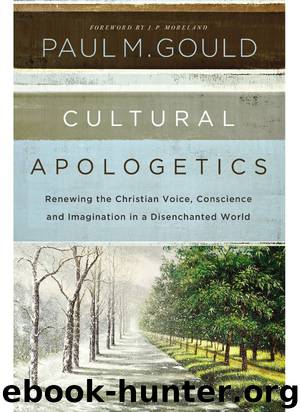Cultural Apologetics by Gould Paul M

Author:Gould, Paul M. [Gould, Paul M.]
Language: eng
Format: epub
Publisher: Zondervan Academic
Published: 2019-03-11T16:00:00+00:00
LOOKING AT REASON
The great Christian minister Isaac Watts (1674–1748) is best known for his theologically rich and moving hymns such as Joy to the World and When I Survey the Wondrous Cross . Less known is Watts’s work writing a textbook on logic and reason, originally published in London in 1724. 30 The book was subtitled The Right Use of Reason in the Inquiry after Truth with a Variety of Rules to Guard against Error in the Affairs of Religion and Human Life, as Well as in the Sciences , and it became the standard text on logic for over one hundred years. It was used in schools such as Oxford, Cambridge, Harvard, and Yale. Watts’s life serves as an example for us today as cultural apologists, showing us how the head and the heart must unite to create and cultivate in a way that embodies goodness, truth, and beauty for the glory of God and the benefit of man.
“Logic,” according to Watts, “is the art of using Reason well in our inquiries after truth, and the communication of it to others.” 31 Cultivating reason, which is “the glory of human nature,” helps us “distinguish good from evil, as well as truth from falsehood.” 32 In the pursuit of truth, “We become acquainted with the name of things both in heaven and earth, and their various relations to each other.” 33 Pursuing truth and engaging the mind must be central in a well-lived life: “Our wisdom, prudence, and piety, our present conduct and our future hope, are all influenced by the use of our rational powers in the search after truth.” 34
Scripture affirms the importance of reason in the pursuit of truth, in our spiritual formation unto Christ, and in our evangelism and apologetic interactions with others. God reveals himself through Scripture and through what he has made. As Francis Bacon said, God has given us two books as sources of truth: the book of God’s works (creation) and the book of God’s word (the Bible). 35 Scripture implores us to study both books: “Do your best to present yourself to God as one approved, a worker who does not need to be ashamed and who correctly handles the word of truth” (2 Tim. 2:15); “Go to the ant, you sluggard; consider its ways and be wise!” (Prov. 6:6).
In Romans 12:2, the apostle Paul connects the use of reason and the mind in spiritual formation: “Do not conform to the pattern of this world, but be transformed by the renewing of your mind. Then you will be able to test and approve what God’s will is—his good, pleasing and perfect will.” And in writing about how we engage others in conversations about Jesus and the gospel, Peter implores believers to “always be prepared to give an answer to everyone who asks you to give the reason for the hope that you have” (1 Peter 3:15). Faithfulness to Christ requires the diligent cultivation of intellectual virtues conducive to the pursuit of truth and love of God and neighbor.
Download
This site does not store any files on its server. We only index and link to content provided by other sites. Please contact the content providers to delete copyright contents if any and email us, we'll remove relevant links or contents immediately.
| Adult Ministry | Children's Ministry |
| Counseling & Recovery | Discipleship |
| Evangelism | Missions & Missionary Work |
| Preaching | Sermons |
| Youth Ministry |
The Rape Of Nanking by Iris Chang(2325)
The Secret Power of Speaking God's Word by Joyce Meyer(2253)
Chosen by God by R. C. Sproul(1760)
Crash the Chatterbox by Steven Furtick(1655)
Knowing God by J.I. Packer(1431)
Habits of Grace by David Mathis(1420)
How To Be Born Again by Billy Graham(1404)
A Prophet with Honor by William C. Martin(1373)
Peace with God by Billy Graham(1318)
God's Smuggler by Brother Andrew(1218)
Confronting Christianity by Rebecca McLaughlin(1193)
Whisper by Mark Batterson(1156)
Angel Dreams by Virtue Doreen Virtue Melissa(1140)
Missionaries by Norman Lewis(1135)
The Truth War by John MacArthur(1106)
The School of Biblical Evangelism by Ray Comfort(1100)
The Poems of Rowan Williams by Rowan Williams(1072)
Do Greater Things by Robby Dawkins(1046)
Eucharistic Miracles by Cruz Joan Carroll(1016)
